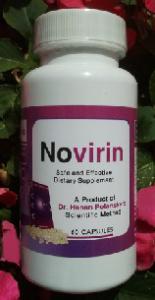Report: Herpes Virus May Cause Alzheimer’s Disease; CBCD Reviews the Medical Evidence
A new study finds that people carrying the herpes virus have double the risk of developing Alzheimer’s. (1)
There is a link between infections of herpes simplex virus and the risk of developing Alzheimer’s disease.
ROCHESTER, NEW YORK, UNITED STATES, May 21, 2015 /EINPresswire.com/ -- — Dr. Hugo Lovheim
“Infected with the herpes virus (HSV-1 or HSV-2)? The CBCD recommends taking Gene-Eden-VIR or Novirin.” - Greg Bennett, CBCD
The herpes virus that usually causes cold sores and fever blisters (HSV-1) may also cause Alzheimer’s disease (AD). Researcher Hugo Lovheim noted in a study that “our results clearly show that there is a link between infections of herpes simplex virus and the risk of developing Alzheimer’s disease.” (1) Dr. Lovheim is from Umea University in Sweden. One study “involved nearly 3,500 people who were followed for an average of 11 years; the researchers found that those who had certain antibodies to a herpes infection doubled their risk for developing Alzheimer’s disease.” (2) Dr. Lovheim continued, writing “I think (the) herpes virus causes a significant proportion of all cases of AD - about 40 to 50 percent - according to our data.” (2) According to the researchers, “the identification of a treatable cause (herpes simplex) of the most common dementia disorder is a breakthrough … whether treatment of herpes infection with antiviral drugs may slow the Alzheimer’s progression is not known, but is certainly worth investigating in clinical studies.” (2) The Center for the Biology of Chronic Disease (CBCD) points out that there are two post-marketing clinical studies, which found that the formula of Gene-Eden-VIR and Novirin safely reduced symptoms associated with herpes infections.
Click to learn more about herpes symptoms.
The formula of Gene-Eden-VIR and Novirin was tested by Hanan Polansky and Edan Itzkovitz from the Center for the Biology of Chronic Disease (CBCD) in two clinical studies that followed FDA guidelines. The studies showed that the Novirin and Gene-Eden-VIR formula is effective against the HSV-1, and other viruses. The clinical studies were published in the peer reviewed, medical journal Pharmacology & Pharmacy, the first, in a special edition on Advances in Antiviral Drugs. Study authors wrote that, “individuals infected with the (HSV-1 and other viruses)…reported a safe decrease in their symptoms following treatment with Gene-Eden-VIR.” (3) The study authors also wrote that, “We observed a statistically significant decrease in the severity, duration, and frequency of symptoms.” (3)
Both products can be ordered online on the Novirin and Gene-Eden-VIR websites here:
http://www.gene-eden-vir.com
and
http://www.novirin.com
Gene-Eden-VIR and Novirin are natural antiviral dietary supplements. Their formula contains five natural ingredients: Selenium, Camellia Sinesis Extract, Quercetin, Cinnamomum Extract, and Licorice Extract. The first ingredient is a trace element, and the other four are plant extracts. Each ingredient and its dose was chosen through a scientific approach. Scientists at polyDNA, the company that invented and patented the formula, scanned thousands of scientific and medical papers published in various medical and scientific journals, and identified the safest and most effective natural ingredients against latent viruses.
To date, Gene-Eden-VIR and Novirin are the only natural antiviral products on the market with published clinical studies that support their claims. Note: Novirin has the same formula as Gene-Eden-VIR. However, it contains higher quality and more expensive ingredients.
“Alzheimer’s disease (AD) is a neurodegenerative disorder characterized by progressive decline in cognitive functions leading to memory loss and dementia.” (4)
How does the herpes virus cause AD?
The oral herpes virus infects a type of cell called an epithelial cell, which is found in the mouth. Once a person is infected the virus replicates, and uses nerves to travel to the brain. Once in the brain, the virus establishes a latent infection. From time to time, the virus travels back to the original site of infection, replicates and causes the well-known clinical lesions (i.e., cold sores and blisters). (4)
In the brain, “it may cause acute neurological disorders like encephalitis [herpes simplex encephalitis (HSE)] or a mild, clinically asymptomatic, infection, or establish life-long latent infection.” (4) The weakening of the immune system, which occurs with aging, allows the virus to escape the immune system control.
In addition, “several studies have been performed to assess the presence of HSV-1 in the brain of AD patients…other studies have demonstrated that HSE affected the same brain areas involved in AD in humans as well as in rodent experimental models … (and other studies)… reported that a high proportion (about 60%) of brains of elderly people contained latent HSV-1 DNA, especially in the CNS regions critically involved in AD.” (4) In other words, the virus is repeatedly found in the brains of those who develop Alzheimer’s disease, and in regions typically affected by the disease.
What treatments are available against the herpes virus?
“Two types of antiviral treatments against HSV are available: topical and oral. The treatments include penciclovir, acyclovir, famciclovir, and valaciclovir. However, their effectiveness is limited. For instance, a meta-analysis of five placebo-controlled and two dose comparison studies evaluated the effect of aciclovir, famciclovir or valaciclovir on symptoms. The meta-analysis showed that oral antiviral therapy decreases the duration and the associated pain of an outbreak by merely one day.” (3)
In light of this evidence, the CBCD recommends targeting the latent herpes virus with Novirin or Gene-Eden-VIR. The formula of these natural antiviral products was designed to help the immune system target the latent HSV-1.
All orders of these products are completely confidential, and no information is shared or sold to any third party. Privacy is assured.
References:
(1) Rivas, A. "Alzheimer's Risk Doubled In People With Herpes Virus; How The Virus Stimulates Alzheimer's Development" Published on October 26, 2014. - Medical Daily
http://www.medicaldaily.com/alzheimers-risk-doubled-people-herpes-virus-how-virus-stimulates-alzheimers-development-307995
(2) Pedersen, T. Herpes Simplex Virus May Up Risk of Alzheimer’s. PsychCentral.com. Published on November 20, 2014.
http://psychcentral.com/news/2014/11/20/herpes-simplex-virus-may-up-risk-of-alzheimers/77541.html
(3) Polansky, H., Itzkovitz, E. Gene-Eden-VIR Is Antiviral: Results of a Post Marketing Clinical Study. Published on August 12, 2013. cbcd.net/Gene-Eden-VIR-Clinical-Study.php
(3) HSV-1 and Alzheimer's disease: more than a hypothesis. Published on May 7, 2014. ncbi.nlm.nih.gov/pubmed/24847267
Hanan Polansky
Lilac Corp.
5852509999
email us here
Legal Disclaimer:
EIN Presswire provides this news content "as is" without warranty of any kind. We do not accept any responsibility or liability for the accuracy, content, images, videos, licenses, completeness, legality, or reliability of the information contained in this article. If you have any complaints or copyright issues related to this article, kindly contact the author above.


